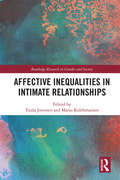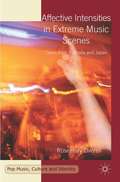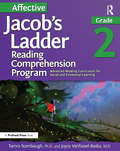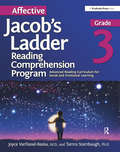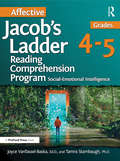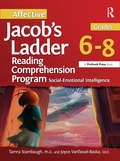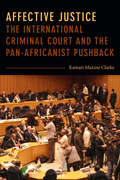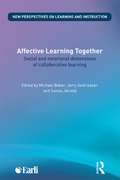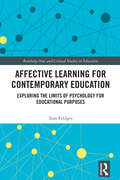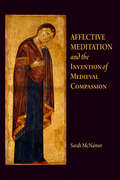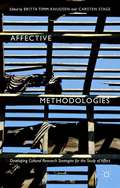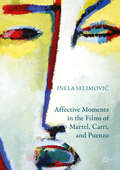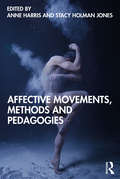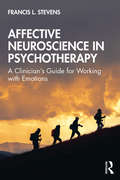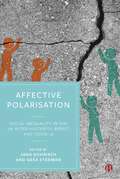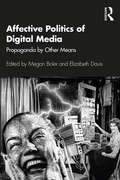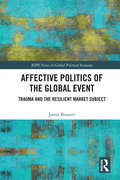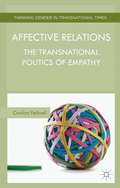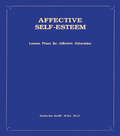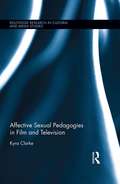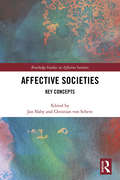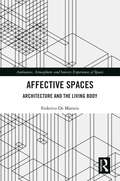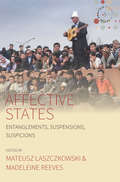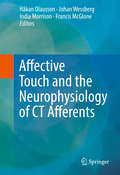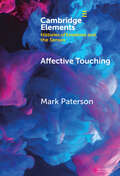- Table View
- List View
Affective Inequalities in Intimate Relationships (Routledge Research in Gender and Society)
by Tuula Juvonen Marjo KolehmainenRaising to the challenge of how to grasp such forms of inequalities that are mediated affectively, Affective Inequalities in Intimate Relationships focuses on subtle inequalities that are shaped in everyday affective encounters. It also seeks to bridge a gap between affect theory and empirical social research by providing ideas and inspiration of how to work with affect in research practice. Presenting cutting-edge empirical studies on affect and intimate relationships, the collection - introduces alternative and novel ways of conceptualizing the workings of affect in intimate relationships - provides tools for tackling the subtle ways in which affectivity connects with power relations in intimate relations - develops innovative methodologies that provide better access to affect as an embodied experience A fascinating contribution to the interdisciplinary field of affect studies, Affective Inequalities in Intimate Relationships will appeal to advanced undergraduates and postgraduates interested in fields such as gender studies, queer studies and cultural studies.
Affective Intensities in Extreme Music Scenes
by Rosemary OverellAn ethnographic study of gender, place and belonging, Affective Intensities introduces readers to the embodied sensations, flows and experiences of being in extreme music scenes in Australia and Japan.
Affective Jacob's Ladder Reading Comprehension Program: Grade 2
by Tamra Stambaugh Joyce VanTassel-BaskaThe Affective Jacob's Ladder Reading Comprehension Program uses a models approach to scaffold student learning and promote inquiry-based discussions of texts. This series of Jacob's Ladder: Focuses specifically on supporting advanced students' social-emotional needs. Includes high-interest reading selections in the following genres: short stories and media, poetry, and biographies. Moves students from lower to higher level skills of self-awareness, metacognition, and goal setting. Integrates reading comprehension and analysis skills with affective and social-emotional needs. Asks students to apply themes, character or real-life experiences, and lessons from texts to their own lives. New ladders were specially designed for this series and derived from relevant theories about empathy, risk and resilience, achievement motivation, and mindsets and practices for cultivating talent. The Affective Jacob's Ladder guides provide teachers with an explanation of the nature and substance of the theoretical constructs for each ladder. Also included are an overview of the goals and objectives of each ladder and suggestions for how to implement the ladders in the classroom in a way that supports students' academic and social-emotional needs at the same time. Optional Student Workbooks In addition to this teacher's guide, companion student workbooks are available for Picture Books, Short Stories and Media, and Poetry and Biographies. The student workbooks feature ample room for student responses and notes, make reviewing and providing feedback on student work easier than ever, provide students with an easy-to-use reference to use during discussions, and save time, as there is no need to reproduce student handouts.
Affective Jacob's Ladder Reading Comprehension Program: Grade 3
by Tamra Stambaugh Joyce VanTassel-BaskaThe Affective Jacob's Ladder Reading Comprehension Program uses a models approach to scaffold student learning and promote inquiry-based discussions of texts. This series of Jacob's Ladder: Focuses specifically on supporting advanced students' social-emotional needs. Includes high-interest reading selections in the following genres: short stories and media, poetry, and biographies. Moves students from lower to higher level skills of self-awareness, metacognition, and goal setting. Integrates reading comprehension and analysis skills with affective and social-emotional needs. Asks students to apply themes, character or real-life experiences, and lessons from texts to their own lives. New ladders were specially designed for this series and derived from relevant theories about empathy, risk and resilience, achievement motivation, and mindsets and practices for cultivating talent. The Affective Jacob's Ladder guides provide teachers with an explanation of the nature and substance of the theoretical constructs for each ladder. Also included are an overview of the goals and objectives of each ladder and suggestions for how to implement the ladders in the classroom in a way that supports students' academic and social-emotional needs at the same time. Optional Student Workbook Packs In addition to this teacher's guide, companion student workbooks are available for Picture Books, Short Stories and Media, and Poetry and Biographies. The student workbooks feature ample room for student responses and notes, make reviewing and providing feedback on student work easier than ever, provide students with an easy-to-use reference to use during discussions, and save time, as there is no need to reproduce student handouts.
Affective Jacob's Ladder Reading Comprehension Program: Grades 4-5
by Tamra Stambaugh Joyce VanTassel-BaskaThe Affective Jacob's Ladder Reading Comprehension Program uses a models approach to scaffold student learning and promote inquiry-based discussions of texts. This series of Jacob's Ladder: Focuses specifically on supporting advanced students' social-emotional needs.Includes high-interest reading selections in the following genres: short stories and media, poetry, and biographies.Moves students from lower to higher level skills of self-awareness, metacognition, and goal setting.Integrates reading comprehension and analysis skills with affective and social-emotional needs.Asks students to apply themes, character or real-life experiences, and lessons from texts to their own lives. New ladders were specially designed for this series and derived from relevant theories about empathy, risk and resilience, achievement motivation, and mindsets and practices for cultivating talent. The Affective Jacob's Ladder guides provide teachers with an explanation of the nature and substance of the theoretical constructs for each ladder. Also included are an overview of the goals and objectives of each ladder and suggestions for how to implement the ladders in the classroom in a way that supports students' academic and social-emotional needs at the same time. Optional Student Workbook Packs In addition to this teacher's guide, companion student workbooks are available for Short Stories and Media, Poetry, and Biographies, Essays and Speeches. The student workbooks feature ample room for student responses and notes, make reviewing and providing feedback on student work easier than ever, provide students with an easy-to-use reference to use during discussions, and save time, as there is no need to reproduce student handouts.
Affective Jacob's Ladder Reading Comprehension Program: Grades 6-8
by Tamra Stambaugh Joyce VanTassel-BaskaThe Affective Jacob's Ladder Reading Comprehension Program uses a models approach to scaffold student learning and promote inquiry-based discussions of texts. This series of Jacob's Ladder: Focuses specifically on supporting advanced students' social-emotional needs.Includes high-interest reading selections in the following genres: short stories and media, poetry, and biographies.Moves students from lower to higher level skills of self-awareness, metacognition, and goal setting.Integrates reading comprehension and analysis skills with affective and social-emotional needs.Asks students to apply themes, character or real-life experiences, and lessons from texts to their own lives. New ladders were specially designed for this series and derived from relevant theories about empathy, risk and resilience, achievement motivation, and mindsets and practices for cultivating talent. The Affective Jacob's Ladder guides provide teachers with an explanation of the nature and substance of the theoretical constructs for each ladder. Also included are an overview of the goals and objectives of each ladder and suggestions for how to implement the ladders in the classroom in a way that supports students' academic and social-emotional needs at the same time. Optional Student Workbook Packs In addition to this teacher's guide, companion student workbooks are available for Short Stories and Media, Poetry and Song Lyrics, and Biographies, Essays, and Speeches. The student workbooks feature ample room for student responses and notes, make reviewing and providing feedback on student work easier than ever, provide students with an easy-to-use reference to use during discussions, and save time, as there is no need to reproduce student handouts.
Affective Justice: The International Criminal Court and the Pan-Africanist Pushback
by Kamari Maxine ClarkeSince its inception in 2001, the International Criminal Court (ICC) has been met with resistance by various African states and their leaders, who see the court as a new iteration of colonial violence and control. In Affective Justice Kamari Maxine Clarke explores the African Union's pushback against the ICC in order to theorize affect's role in shaping forms of justice in the contemporary period. Drawing on fieldwork in The Hague, the African Union in Addis Ababa, sites of postelection violence in Kenya, and Boko Haram's circuits in Northern Nigeria, Clarke formulates the concept of affective justice—an emotional response to competing interpretations of justice—to trace how affect becomes manifest in judicial practices. By detailing the effects of the ICC&’s all-African indictments, she outlines how affective responses to these call into question the "objectivity" of the ICC&’s mission to protect those victimized by violence and prosecute perpetrators of those crimes. In analyzing the effects of such cases, Clarke provides a fuller theorization of how people articulate what justice is and the mechanisms through which they do so.
Affective Learning Together: Social and emotional dimensions of collaborative learning (New Perspectives on Learning and Instruction)
by Michael Baker Jerry Andriessen Sanna JärveläIn the twenty-first century, being able to collaborate effectively is important at all ages, in everyday life, education and work, within and across diverse cultural settings. People are increasingly linked by networks that are not only means for working and learning together, but are also ways of maintaining social and emotional support. Collaborating with others requires not only elaborating new ideas together, but also being able to manage interpersonal relations. In order to design and facilitate effective collaborative situations, the challenge is therefore to understand the interrelations between social, affective and cognitive dimensions of interactions in groups. Affective Learning Together contains in-depth theoretical reviews and case studies of group learning in a variety of educational situations and taught disciplines, from small groups working in the secondary school classroom, to teams of medical students and more informal working groups at university level. Contributors provide detailed analyses of the dynamics of interpersonal relations and affects, in relation with processes of meaning and knowledge elaboration, including discussion of: the variety of social learning situations and experiences; social identities in group learning; emotion, motivation and knowledge elaboration; conflict, arguments and interpersonal tensions in group learning. Bringing together a broad range of contributions from internationally recognised researchers who are seeking to broaden, deepen and integrate the field of research on collaborative learning, this book is essential reading for all serious students of contemporary educational research and practice.
Affective Learning for Contemporary Education: Exploring the Limits of Psychology for Educational Purposes (Routledge New and Critical Studies in Education)
by Tom FeldgesThis book dissects the relationship between the disciplines of Psychology and Education Studies to provide a new and critical perspective on the usefulness of psychological research and theory for educational purposes.Assuming that affective states form an important part of how humans relate to their environment, this book posits that the currently dominant cognitive approach to the field of psychology is unable to account sufficiently for this experiential reality of human life. Providing a philosophical investigation of this disparity, chapters offer an in-depth discussion of affective states for transformative learning, chart the journey of Psychology as an independent academic discipline, and engage classical learning theories in order to offer a broader understanding of complex, field-specific arguments, and engage readers from multidisciplinary backgrounds. Provoking a true paradigm shift in the field of Education Studies based on its own theoretical underpinnings, this book ultimately initiates a partnership between both disciplines to demonstrate a progressive and radical approach to the way we teach and think about the field of education studies.This cutting-edge book will be of relevance to scholars, researchers, and postgraduate students in the fields of Education Studies, educational psychology, the theory of education, and the philosophy of education more broadly. Senior professionals and academics who wish to expand their knowledge in relation to the international literature of this field would further benefit from this volume more broadly.
Affective Meditation and the Invention of Medieval Compassion (The Middle Ages Series)
by Sarah McNamerAffective meditation on the Passion was one of the most popular literary genres of the high and later Middle Ages. Proliferating in a rich variety of forms, these lyrical, impassioned, script-like texts in Latin and the vernacular had a deceptively simple goal: to teach their readers how to feel. They were thus instrumental in shaping and sustaining the wide-scale shift in medieval Christian sensibility from fear of God to compassion for the suffering Christ.Affective Meditation and the Invention of Medieval Compassion advances a new narrative for this broad cultural change and the meditative writings that both generated and reflected it. Sarah McNamer locates women as agents in the creation of the earliest and most influential texts in the genre, from John of Fécamp's Libellus to the Meditationes Vitae Christi, thus challenging current paradigms that cast the compassionate affective mode as Anselmian or Franciscan in origin. The early development of the genre in women's practices had a powerful and lasting legacy. With special attention to Middle English texts, including Nicholas Love's Mirror and a wide range of Passion lyrics and laments, Affective Meditation and the Invention of Medieval Compassion illuminates how these scripts for the performance of prayer served to construct compassion itself as an intimate and feminine emotion. To feel compassion for Christ, in the private drama of the heart that these texts stage, was to feel like a woman. This was an assumption about emotion that proved historically consequential, McNamer demonstrates, as she traces some of its legal, ethical, and social functions in late medieval England.
Affective Methodologies: Developing Cultural Research Strategies For The Study Of Affect
by Britta Timm Knudsen Carsten StageThe collection proposes inventive research strategies for the study of the affective and fluctuating dimensions of cultural life. It presents studies of nightclubs, YouTube memes, political provocations, heritage sites, blogging, education development, and haunting memories.
Affective Moments in the Films of Martel, Carri, and Puenzo
by Inela Selimović<P>This book studies the intimate tensions between affect and emotions as terrains of sociopolitical significance in the cinema of Lucrecia Martel, Albertina Carri, and Lucía Puenzo. Such tensions, Selimović argues, result in “affective moments” that relate to the films’ core arguments. <P>They also signal these filmmakers’ novel insights on complex manifestations of memory, desire, and violence. <P>The chapters explore how the presence of pronounced—but reticent—affect complicates emotional bonding in the everydayness depicted in these films. By bringing out moments of affect in these filmmakers’ diegetic worlds, this book traces the ways in which subtle foci on gender, class, race, and sexuality correlate in these Argentine women’s films.
Affective Movements, Methods and Pedagogies
by Anne Harris and Stacy Holman JonesAffective Movements, Methods and Pedagogies invites readers to think with affect about performance, pedagogies and their inherent activist, embodied and collective natures. It works across multiple spheres to help readers understand how to deploy affective approaches rather than to simply think with affect theory about traditional methods. The book is structured and curated across three main thematic sections: affective movements, methods and pedagogies, each of which treats the core explorations of affect and performance through a different perspective. It is concerned with the ways performance and theatrical methods work with and through a theoretics of affect. The sixteen chapters include work that models theoretical practices in writing, and demonstrates how theorising affect and its methods is itself a performative practice. The contributors offer rich examples from diverse geopolitical as well as disciplinary contexts, innovative methods, and finally, intersectional theoretics. This collection will be of interest to higher education students exploring methodologies, and academic researchers and teachers in the fields of performance studies, communication, critical studies, sociology and the arts.
Affective Neuroscience in Psychotherapy: A Clinician's Guide for Working with Emotions
by Francis L. StevensMost psychological disorders involve distressful emotions, yet emotions are often regarded as secondary in the etiology and treatment of psychopathology. This book offers an alternative model of psychotherapy, using the patient’s emotions as the focal point of treatment. This unique text approaches emotions as the primary source of intervention, where emotions are appreciated, experienced, and learned from as opposed to being regulated solely. Based on the latest developments in affective neuroscience, Dr. Stevens applies science-based interventions with a sequential approach for helping patients with psychological disorders. Chapters focus on how to use emotional awareness, emotional validation, self-compassion, and affect reconsolidation in therapeutic practice. Interventions for specific emotions such as anger, abandonment, jealousy, and desire are also addressed. This book is essential reading for clinicians practicing psychotherapy, social workers and licensed mental health counselors, as well as anyoe interested in the emotional science behind the brain.
Affective Polarisation: Social Inequality in the UK after Austerity, Brexit and COVID-19
by Jana Gohrisch and Gesa StedmanInequality is an ever-present danger in our society. This important book addresses the crucial nexus between the lived experience of inequality and how it shapes political responses. With contributors from the UK and Continental Europe, the book compiles case studies with theoretically informed discussions of the relationship between affective polarisation, social inequality and the fall-out from Brexit and COVID-19. Using a broad concept of social inequality, the book incorporates aspects of economy and society, language, and emotion culture, as well as interviews and film in historical and transnational perspectives. The contributors offer a powerful examination of the ways in which the politics of the UK and the lived experiences of its residents have been reframed in the first decades of the 21st century.
Affective Politics of Digital Media: Propaganda by Other Means
by Megan BolerThis interdisciplinary, international collection examines how sophisticated digital practices and technologies exploit and capitalize on emotions, with particular focus on how social media are used to exacerbate social conflicts surrounding racism, misogyny, and nationalism. Radically expanding the study of media and political communications, this book bridges humanities and social sciences to explore affective information economies, and how emotions are being weaponized within mediatized political landscapes. The chapters cover a wide range of topics: how clickbait, "fake news," and right-wing actors deploy and weaponize emotion; new theoretical directions for understanding affect, algorithms, and public spheres; and how the wedding of big data and behavioral science enables new frontiers of propaganda, as seen in the Cambridge Analytica and Facebook scandal. The collection includes original interviews with luminary media scholars and journalists. The book features contributions from established and emerging scholars of communications, media studies, affect theory, journalism, policy studies, gender studies, and critical race studies to address questions of concern to scholars, journalists, and students in these fields and beyond.
Affective Politics of the Global Event: Trauma and the Resilient Market Subject (RIPE Series in Global Political Economy)
by James BrassettMarket life is increasingly conducted in the shadow of global events like 9/11, the Sub-Prime crisis and Brexit. Within International political economy (IPE) two broad positions can be discerned: either the event is ‘just an event’, a superficial spectacle in an otherwise straightforward story of power and hierarchy; or the event is large enough to be considered a ‘crisis’. While sympathetic to such arguments, this book develops a more performative politics of the global event, arguing that the very idea of the event must be placed in question. How is the event constructed? How are market subjects performed in relation to the event? This book argues that emotional and psychological discourses of ‘trauma’ and ‘resilience’ provide an important affective register for understanding how the global event is ‘known’, how it is governed, and how the affective dimensions of market life might be lived. By identifying the contingent rise of these discourses, the author de-stabilises and re-politicises the apparent existential veracity of the global event. The critical possibilities and limits of the affective turn in market life can then be rendered according to classic questions of IPE: who wins, who loses, and how might it be changed? An important work for advanced scholars and students of international political economy, ‘everyday and cultural political economy’, crisis and resilience, as well as broader debates on globalisation.
Affective Relations
by Carolyn PedwellExploring the ambivalent grammar of empathy where questions of geo-politics and social justice are at stake - in popular science, international development, postcolonial fiction, feminist and queer theory - this book addresses the critical implications of empathy's uneven effects. It offers a vital transnational perspective on the 'turn to affect'.
Affective Self-Esteem: Lesson Plans For Affective Education
by Katherine KrefftFirst published in 1993. Routledge is an imprint of Taylor & Francis, an informa company.
Affective Sexual Pedagogies in Film and Television (Routledge Research in Cultural and Media Studies)
by Kyra ClarkePopular film and television hold valuable potential for learning about sex and sexuality beyond the information-based model of sex education currently in schools. This book argues that the representation of complicated—or "messy"—relationships in these popular cultural forms makes them potent as affective pedagogical moments. It endeavours to develop new sexual literacies by contemplating how pedagogical moments, that is, fleeting moments which disrupt expectations or create discomfort, might enrich the available discourses of sexuality and gender, especially those available to adolescents. In Part One, Clarke critiques the heteronormative discourses of sex education that produce youth in particularly gendered ways, noting that "rationality" is often expected to govern experiences that are embodied and arguably inherently incoherent. Part Two explores public intimacy, contemplating the often overlapping and confused boundaries between public and private.
Affective Societies: Key Concepts (Routledge Studies in Affective Societies)
by Jan Slaby Christian Von ScheveAffect and emotion have come to dominate discourse on social and political life in the mobile and networked societies of the early 21st century. This volume introduces a unique collection of essential concepts for theorizing and empirically investigating societies as Affective Societies. The concepts promote insights into the affective foundations of social coexistence and are indispensable to comprehend the many areas of conflict linked to emotion such as migration, political populism, or local and global inequalities. Adhering to an instructive narrative, Affective Societies provides historical orientation; detailed explication of the concept in question, clear-cut research examples, and an outlook at the end of each chapter. Presenting interdisciplinary research from scholars within the Collaborative Research Center "Affective Societies," this insightful monograph will appeal to students and researchers interested in fields such as affect and emotion, anthropology, cultural studies, and media studies.
Affective Spaces: Architecture and the Living Body (Ambiances, Atmospheres and Sensory Experiences of Spaces)
by Federico De MatteisThis book explores the notion of affective space in relation to architecture. It helps to clarify the first-person, direct experience of the environment and how it impacts a person’s emotional states, influencing their perception of the world around them. Affective space has become a central notion in several discussions across philosophy, geography, anthropology, architecture and so on. However, only a limited selection of its key features finds resonance in architectural and urban theory, especially the idea of atmospheres, through the work of German phenomenologist Gernot Böhme. This book brings to light a wider range of issues bound to lived corporeal experience. These further issues have only received minor attention in architecture, where the discourse on affective space mostly remains superficial. The theory of atmospheres, in particular, is often criticized as being a surface-level, shallow theory as it is introduced in an unsystematic and fragmented fashion, and is a mere "easy to use" segment of what is a wider and all but impressionistic analytical method. This book provides a broader outlook on the topic and creates an entry point into a hitherto underexplored field. The book’s theoretical foundation rests on a wide range of non-architectural sources, primarily from philosophy, anthropology and the cognitive sciences, and is strengthened through cases drawn from actual architectural and urban space. These cases make the book more comprehensible for readers not versed in contemporary philosophical trends.
Affective States: Entanglements, Suspensions, Suspicions
by Madeleine Reeves Mateusz LaszczkowskiIn recent years, political and social theory has been transformed by the heterogeneous approaches to feeling and emotion jointly referred to as 'affect theory'. These range from psychological and social-constructivist approaches to emotion to feminist and post-human perspectives. Covering a wide spectrum of topics and ethnographic contexts-from engineering in the Andes to household rituals in rural China, from South African land restitution to migrant living in Moscow, and from elections in El Salvador to online and offline surveillance among political refugees from Uzbekistan and Eritrea-the chapters in this volume interrogate this 'affective turn' through the lens of fine-grained ethnographies of the state. The volume enhances the anthropological understanding of the various ways through which the state comes to be experienced as a visceral presence in social life.
Affective Touch and the Neurophysiology of CT Afferents
by Håkan Olausson Johan Wessberg India Morrison Francis McgloneCT afferents are receptors in mammalian hairy skin that fire action potentials when the skin is touched lightly which makes them particularly important in affective touch. Traditionally neuroscientific research has focused on more discriminative and haptic properties of touch that are mediated by large myelinated afferents and the coding properties and functional organization of unmyelinated CT afferents have been studied much less. The proposed volume will draw together existing knowledge in this nascent field. Separate sections will address (1) how we can measure affective touch, (2) CT structure and physiology, (3) CT processing, (4) the contribution of CTs to sexual behavior, (5) clinical relevance, (6) commercial relevance, and (7) future research considerations.
Affective Touching: Neurobiology and Technological Applications (Elements in Histories of Emotions and the Senses)
by Mark PatersonAt the end of the twentieth century the discovery of 'slow', affective touch nerves in humans known as C Tactile (CT) afferents, which are entirely separate from the faster pathways for touching objects, had huge social implications. The Swedish neuroscientists responsible formulated an “affective touch hypothesis” or “social touch hypothesis” to consider their purpose. Part I offers a history of the science of social touch, from related discoveries in mammals by physiologists in the 1930s, to the recent rediscoveries of the CT nerves in humans. Part II considers how these findings are being intentionally folded into technologies for interaction. First, as mediated social touch, communicating at a distance through haptics. Second, with the increasing number of social and service robots in health care and domestic settings, the role of affective touch within human-robot interaction design.
